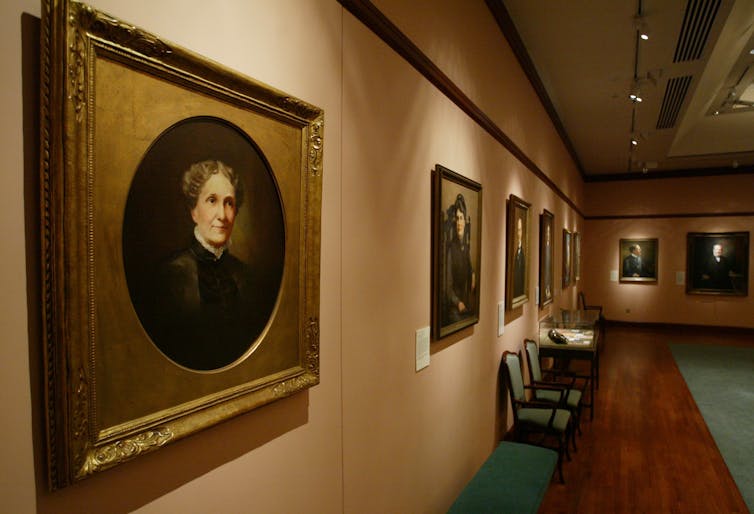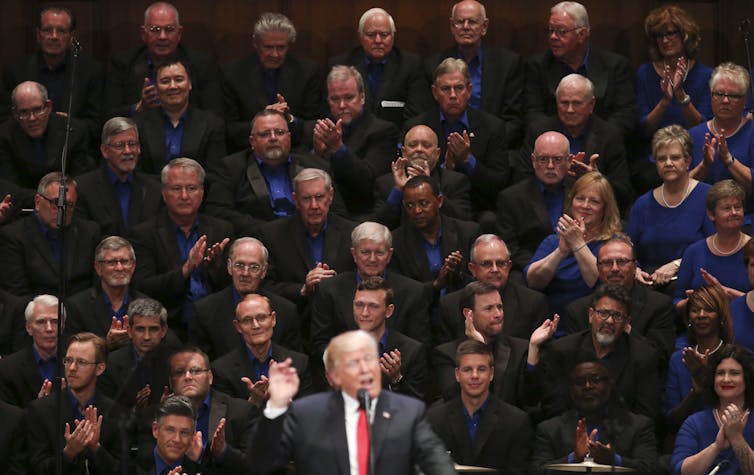What it means to be a Christian in America today
- Written by Matthew Bowman, Associate Professor of History, Henderson State University
President Donald Trump spoke recently to the Campaign for Life Gala[1], an annual Washington gathering of activists opposed to abortion. There he declared that Americans depend upon divine protection to ensure that “our nation will thrive and our people will prosper.” As long as we “trust in our God,” Trump said[2], “then we will never, ever fail.”
The speech was recent, but the sentiments were not. Presidents have been uttering similar sentiments for decades[3].
This may seem strange in a nation whose Constitution declares[4] that the government will “make no law respecting an establishment of religion.” But in fact, from my perspective as author[5] of the new book “Christian: The Politics of a Word in America[6],” these presidential invocations of religion reflect the fact that Americans have debated what it means to be religious in politics throughout American history.
Because a wide majority of Americans have claimed some form of Christian belief, these debates focused on Christianity. And they continue today.
Many Christianities
From the very beginning of European settlement in the United States, a wide range of Christian faiths appeared in America. Roman Catholics, Baptists and Methodists saw their numbers rise[7] in the early 19th century. By the 20th century, Americans were claiming[8] a variety of religious identities. They joined the Jehovah’s Witnesses[9], Mormonism, black Pentecostal churches and Reverend Sun Myung Moon’s Unification Church, among dozens of others.
At the same time, however, the Constitution forbade the federal government from instituting a state church. By the 1830s, each state in the Union had also abolished[10] state-sponsored churches.
This meant all these new faiths competed for membership, attention and prominence in American culture. Indeed, it is this sense of religious competition that has driven religious growth in the United States. Joseph Smith, the founder of Mormonism, began his church because, he felt[11] that “there[12] was no society or denomination that built upon the gospel of Jesus Christ as recorded in the new testament.”
His solution to the conundrum encapsulates the energies of American Christianity. A visionary experience led him to conclude that no Christian church in the United States possessed the true gospel – and so the answer was to found a new one. By the time of his death 14 years after he had founded the church, he had attracted some 12,000[13] followers.
Other American religious innovators followed a similar path. They contributed new ideas, new sects and new ways of being Christian. Often these new Christianities had social and political implications.
 A portrait of Christian Science church founder Mary Baker Eddy, at the Longyear Museum, in Brookline, Mass.
AP Photo/Julia Malakie
A portrait of Christian Science church founder Mary Baker Eddy, at the Longyear Museum, in Brookline, Mass.
AP Photo/Julia Malakie
For example, the escaped slave Frederick Douglass denounced[14] white slave-holding Christians as hypocrites and became a preacher for the African Methodist Episcopal Church, a branch of Methodism founded by African-Americans. Mary Baker Eddy despaired[15] that no Christian church she could find sufficiently embraced the doctrine of faith healing, and so she founded Christian Science.
In other words, Christianity multiplied into Christianities.
Multiple beliefs
There are as many variants of Christianity in the United States as there are ways of believing that Christianity is foundational to American politics.
For instance, some Protestants argue that their faith’s emphasis on the individual means that Christianity supports the free market[16]. However, Roman Catholics, who emphasize community and institution, have long been much more skeptical[17] of capitalism.
Such disputes have often marked[18] the national debate about what government policies might most or least express Christian principles.
During the black freedom movement, when African-Americans protested segregation and voting restrictions, black religious leaders like Martin Luther King Jr. maintained[19] that Christian teaching mandated political equality for people of all races. On the other hand, some white Christian leaders argued[20] that Christianity taught that certain people were morally inferior to others and therefore segregation was desirable.
To American Christians, who still make up more than[21] two-thirds of the nation’s population, beliefs like these are fundamental to understanding how society should be organized. For many believers, a religion is more[22] than simply a moral code; it is a way of explaining the nature of the universe. It thus governs both how they think politics should work and what policies should be enacted.
Christians and democracy
White American Protestants have frequently claimed[23] that American democracy derives from Protestant Christianity. They associate Protestantism’s emphasis on salvation through individual faith and the individual encounter with God with individual liberty in the political sphere.
They link[24] the rise of democracy in Europe and the United States with the Protestant Reformation. For them, democracy and Christianity are inseparable from American roots in European history.
This assumption that Christianity is essential for democracy was behind[25] white evangelicals’ support for Donald Trump in the 2016 U.S. presidential election.
Trump was widely criticized[26] for his bungling of Christian scripture and his evident lack of adherence to Christian norms and behavior in his private life.
 President Donald Trump, as he speaks during the Celebrate Freedom event at the Kennedy Center for the Performing Arts in Washington, on July 1, 2017. Members of the First Baptist Dallas Church Choir are seated behind him.
AP Photo/Carolyn Kaster
President Donald Trump, as he speaks during the Celebrate Freedom event at the Kennedy Center for the Performing Arts in Washington, on July 1, 2017. Members of the First Baptist Dallas Church Choir are seated behind him.
AP Photo/Carolyn Kaster
But, at the same time, Trump assured[27] one group of anxious American Christians that he understood their fears. White American Protestant evangelicals, who believed that American democracy and their form of Christianity were linked, voted[28] for Trump. They feared[29] that immigration was destroying America’s European heritage, and that as white Protestantism waned, democracy itself would collapse.
There are many[30] who have claimed that Donald Trump does not understand Christianity. I would argue he understands the turbulence[31] and chaos[32] of the American Christian marketplace all too well.
References
- ^ Campaign for Life Gala (www.sba-list.org)
- ^ Trump said (www.sba-list.org)
- ^ decades (www.nationaldayofprayer.org)
- ^ declares (law2.umkc.edu)
- ^ author (scholar.google.com)
- ^ Christian: The Politics of a Word in America (www.hup.harvard.edu)
- ^ saw their numbers rise (xroads.virginia.edu)
- ^ were claiming (hirr.hartsem.edu)
- ^ Jehovah’s Witnesses (theconversation.com)
- ^ each state in the Union had also abolished (americanhistory.oxfordre.com)
- ^ he felt (digitalcommons.usu.edu)
- ^ there (www.josephsmithpapers.org)
- ^ he had attracted some 12,000 (scholarsarchive.byu.edu)
- ^ denounced (www.christianitytoday.com)
- ^ despaired (www.christianscience.com)
- ^ Christianity supports the free market (mises.org)
- ^ skeptical (www.patheos.com)
- ^ marked (slate.com)
- ^ maintained (www.christianitytoday.com)
- ^ argued (www.clarionledger.com)
- ^ more than (www.pewforum.org)
- ^ more (www.colorado.edu)
- ^ claimed (www.heritage.org)
- ^ link (www.ebenezeroldhill.org.uk)
- ^ behind (www.politicalresearch.org)
- ^ criticized (www.npr.org)
- ^ assured (www.vox.com)
- ^ voted (www.thenation.com)
- ^ feared (www.washingtonpost.com)
- ^ many (www.beliefnet.com)
- ^ turbulence (wallbuilders.com)
- ^ chaos (www.christianfreedom.org)
Authors: Matthew Bowman, Associate Professor of History, Henderson State University
Read more http://theconversation.com/what-it-means-to-be-a-christian-in-america-today-97981

